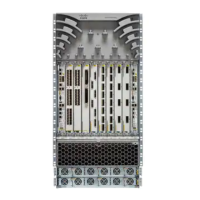PurposeCommand or Action
The following example pkgIndex is created when some Tcl package
files are in a library file directory and the pkg_mkindex command
is run:
pkgIndex
# Tcl package index file, version 1.1
# This file is generated by the "pkg_mkIndex" command
# and sourced either when an application starts up or
# by a "package unknown" script. It invokes the
# "package ifneeded" command to set up package-related
# information so that packages will be loaded
automatically
# in response to "package require" commands. When this
# script is sourced, the variable $dir must contain the
# full path name of this file's directory.
package ifneeded xmlrpc 0.3 [list source [file join $dir
xmlrpc.tcl]]
—
Copy the Tcl package files from Step 1 and the
pkgIndex file from Step 3 to the directory used for
storing user library files on the target router.
Step 4
The directory can be the same directory used in Step 4, on page
79.
Copy a user-defined EEM policy file written in Tcl
to the directory used for storing user-defined EEM
policies on the target router.
Step 5
The following example user-defined EEM policy can be used to
test the Tcl library support in EEM:
packagetest.tcl
::cisco::eem::event_register_none maxrun 1000000.000
#
# test if xmlrpc available
#
#
# Namespace imports
#
namespace import ::cisco::eem::*
namespace import ::cisco::lib::*
#
package require xmlrpc
puts "Did you get an error?"
configure
Step 6
Specifies the EEM user library directory; this is the directory to
which the files in Step 4, on page 79were copied.
event manager directory user library path
Example:
RP/0/RSP0/CPU0:router(config)# event manager
directory user library disk2:/eem_library
Step 7
Cisco ASR 9000 Series Aggregation Services Router System Monitoring Configuration Guide, Release 4.2.x
79
Configuring and Managing Embedded Event Manager Policies
How to Write Embedded Event Manager Policies Using Tcl

